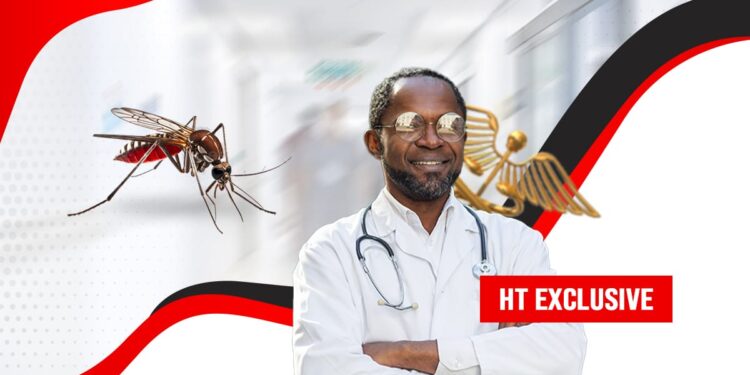By Ere-Ebi Agedah Imisi
According to the recent world malaria report, the global count of malaria deaths reached 429,000 in a year, with sub-saharan Africa as the most affected, as malaria continues to be the highest killer disease.
Malaria, a relentless adversary, continues to cast its shadow over Africa, claiming lives and crippling communities. Despite significant strides in combating the disease, malaria remains a formidable challenge, especially in sub-Saharan Africa, where it poses a significant public health burden.
In the ongoing battle against malaria, African health experts are amplifying their advocacy for a significant escalation in pharmaceutical research efforts. Malaria remains a critical health concern across the continent, posing significant challenges to public health systems and economic development. The call for increased research comes as experts recognize the urgent need for innovative solutions to combat the disease effectively.
African nations continue to bear a disproportionate burden of malaria cases and related fatalities globally. Despite concerted efforts to control the spread of the disease through various interventions such as mosquito net distribution and improved access to anti-malarial drugs, malaria persists as a formidable health threat.
READ ALSO: Where Is Niger’s Mohammed Bazoum?
At a recent gathering in Abuja, Nigeria’s Federal Capital Territory, health specialists from across 17 African countries convened to address the pressing issue. Emphasizing the importance of collaborative action, experts underscored the critical role of pharmaceutical research in developing more efficacious drugs to treat and prevent malaria.
Word on the street
Heritage Times HT conducted interviews with individuals on the street. Out of the 5 persons interviewed, each one or a member of their family had undergone treatment for malaria within the past month.
Speaking with Heritage Times HT, Tolulope Adeniyi said, just last month, my younger brother was diagnosed with malaria. It was quite a challenging time for us as a family, but thankfully, he received prompt treatment, and he’s recovering well now.
Also, our correspondent inquired of Abdul Sule, a father of three, whether he or any member of his family had experienced any recent health issues.
‘‘Yes, indeed. My wife actually battled malaria about three weeks ago. It was unexpected and quite concerning, but we sought medical attention promptly, and she responded well to treatment. Malaria can be quite debilitating if not addressed swiftly’’ Abdul said.
In addition, Heritage Times HT spoke with Caroline Adelanwa, who said ‘‘Just a few weeks back, my son came down with a high fever, and after visiting the doctor, it turned out to be malaria. It was a worrying time for us, especially given the prevalence of malaria in our area. Thankfully, with the right medication and care, he’s on the road to recovery now’’.
It’s evident that malaria remains a significant health concern for many families, and timely treatment is crucial for recovery.
The Malaria menace
Malaria, transmitted through the bite of infected mosquitoes, exacts a heavy toll on human health and economic prosperity. According to the World Health Organization (WHO), the African region accounts for approximately 94% of global malaria cases and deaths, with children under five years of age and pregnant women being the most vulnerable cohorts.
Ned Nwoko is a strong advocate of malaria eradication in Africa. He is the initiator of the Ned Nwoko Malaria Eradication Project. He flagged off the Ned Nwoko Malaria Eradication campaign via a symbolic expedition to the Antarctica in January 2020. The Foundation is supporting the existing efforts of vaccine development by funding a research for the anti-malaria vaccine through a partnership with leading universities in Africa and other research establishments.
Founder and chairman of the Foundation, Prince Ned Nwoko, the Delta North Senator and chancellor of Sports University of Nigeria (SUN), while reacting to the Nigerian government’s approval of the Oxford University malaria vaccine, R21/Matrix-M vaccine, stated that, the ultimate solution to malaria endemic is a clean environment through waste management and recycling plants.
Impact of Malaria vaccine implementation in Kenya
“The burden [of malaria] increased, and we needed an additional tool,” explained Dr. Gregory Ganda, Kisumu County Executive for Health, reflecting on the introduction of the malaria vaccine.
Three years into its implementation, the vaccine has emerged as a crucial and life-saving addition to Kenya’s malaria control arsenal. Alongside existing interventions like insecticide-treated bed nets, indoor residual spraying, preventive treatment for pregnant women, and effective medications, the vaccine plays a pivotal role.
Since its rollout in certain regions of Kenya, hospitalizations of children under 5 for severe malaria have significantly decreased, leading to a notable reduction in child mortality rates.
“Over the past 3 years, we’ve witnessed a significant reduction in pediatric admissions due to malaria,” said Dr. Ganda. “It’s a remarkable feeling as a healthcare provider when you contemplate closing a ward due to lack of patients.”
The imperative for vaccines
Vaccination stands as one of the most effective strategies for preventing infectious diseases. However, the development of a malaria vaccine has proven to be an elusive goal. While progress has been made with the development and distribution of the RTS,S/AS01 (RTS,S) vaccine, its efficacy remains modest, highlighting the complexity of malaria immunology.
African health experts emphasize the need for more investment and research focused specifically on malaria vaccine development tailored to the diverse strains prevalent in Africa. They argue that a robust vaccine holds the potential to significantly reduce malaria transmission rates, thereby easing the burden on healthcare systems and improving the quality of life for millions across the continent.
Challenges and opportunities
The road to a malaria vaccine is fraught with challenges, ranging from the biological complexity of the parasite to the logistical hurdles of clinical trials and vaccine deployment. Moreover, funding constraints and competing global health priorities often limit the resources allocated to malaria research.
However, amid these challenges, there exists a glimmer of hope. Advances in pharmaceutical drugs, vaccine technology provide unprecedented opportunities for breakthroughs in malaria vaccine development. Collaborative efforts between African research institutions, international organizations, and pharmaceutical companies have yielded promising results that warrant further exploration.
The way forward
As African health experts stress the importance of sustained political commitment and financial investment to drive malaria vaccine research forward. They urge governments, philanthropic organizations, and the private sector to prioritize funding for research initiatives aimed at accelerating the development and deployment of a highly effective malaria vaccine.
Furthermore, they emphasize the importance of community engagement and capacity-building efforts to ensure equitable access to vaccines once they become available. Empowering local healthcare systems and fostering partnerships between researchers, policymakers, and communities are integral to the success of malaria control efforts.
Malaria remains a formidable challenge that demands urgent and concerted action. As Africa grapples with the burden of this preventable and treatable disease, the call for increased investment in malaria vaccine research grows louder. By harnessing the collective expertise and resources of the global health community, we can turn the tide against malaria and forge a future where generations are no longer shackled by its devastating impact.
In the quest for a malaria-free Africa, the advocacy for increased pharmaceutical research aligns with broader efforts to achieve sustainable malaria control and eventual eradication in Africa. Investing in research initiatives tailored to the continent’s specific needs holds the promise of delivering breakthrough interventions that can significantly reduce the burden of malaria and improve health outcomes for millions of people.




































